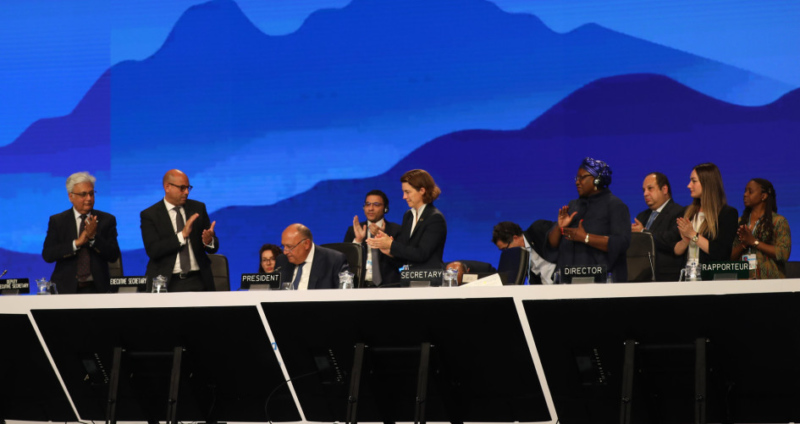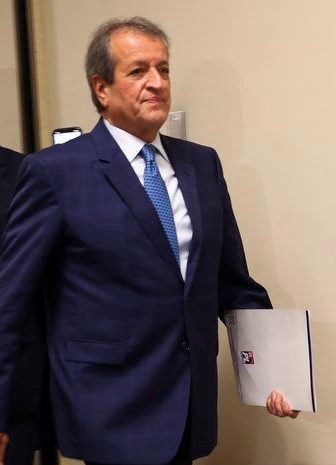Latin America Advisor
Latin America Advisor
A Publication of The Dialogue
Did Latin America and the Caribbean Do Well at COP27?
 The United Nations Climate Change Conference COP27 closed Monday. // Photo: United Nations.
The United Nations Climate Change Conference COP27 closed Monday. // Photo: United Nations.
The 27th annual United Nations Climate Change Conference, or COP27, was held in Egypt on Nov. 6-18. The world’s largest climate event with more than 190 participating countries, it brought together heads of state, ministers, civil society, and private sector representatives to discuss mitigation efforts and adaptation to climate change. What are the biggest takeaways from COP27 for Latin America and the Caribbean? What new climate mitigation innovations and financing mechanisms have the most promise for helping nations in the Western Hemisphere that are struggling with climate change? How much of a voice was Latin American and Caribbean nations given in leading the international negotiations?
-
Daniela Stevens and MK Vereen, director and assistant, respectively, in the Inter-American Dialogue’s Energy, Climate Change & Extractive Industries Program: “At COP27, Latin America rallied around increased adaptation finance and Amazon conservation but remained split regarding the future of fossil fuels. In a historic win for adaptation, wealthy nations agreed to establish a ‘loss and damage’ fund to compensate vulnerable countries’ climate-linked losses. While details of the deal will not be finalized until the next COP, the decision is a lifeboat especially for Small Island Developing States, many of which are in the Caribbean. Member states also called on Multilateral Development Banks (MDBs) to alleviate climate impacts and debt burdens in developing countries by providing loans at lower interest rates, pausing debt repayments for poorer nations hit by climate disasters, and expanding and standardizing debt for nature swaps. While the parties ratified this proposal, the agreement is non-binding for MDBs. On the mitigation side, the region remains divided regarding the phaseout of fossil fuels; however, clean energy commitments increased. Despite doubling down on fossil fuels, President López-Obrador of Mexico vowed to dramatically increase renewable energy production, although it is dubious whether the country will find financing for these projects. Since COP26, major methane emitters like Brazil, Colombia and Mexico are taking concrete action to bring down methane emissions. Presidents Petro of Colombia, Lula of Brazil, and even Maduro of Venezuela rallied around increased Amazon protection. Overall, despite calls for regional unification, Latin American nations still lack…”
Read More
Top News
Peru Offers to Host Rescheduled Pacific Alliance Summit in December

Bolsonaro Backs Party’s Election Complaint
Complete editions of the Latin America Advisor are delivered every business day to members of the Dialogue's Corporate Program and other subscribers. Sign up below for a complimentary preview subscription.
About the Latin America Advisor
The Inter-American Dialogue publishes the Latin America Advisor every business day for a distinguished membership of informed corporate leaders, scholars, and government officials invested in Latin America’s development and future. The Advisor‘s highly regarded Q&A section covers questions submitted by subscribers themselves. Commentators regularly include heads of state, business leaders, diplomats, economists, analysts, and thought leaders from around the world. Many of the world’s largest and fastest-growing companies subscribe to the Advisor. To subscribe click here or for more information, contact Erik Brand, publisher of the Advisor, at ebrand@thedialogue.org.
Subscribers See all









Staff
Erik Brand
Publisher
P. 202.463.2932
E. ebrand@thedialogue.org
Gene Kuleta
Editor
P. 202.463.2920
E. gkuleta@thedialogue.org
Lara Kovandova
Reporter
P. 202.463.2936
E. lkovandova@thedialogue.org





















